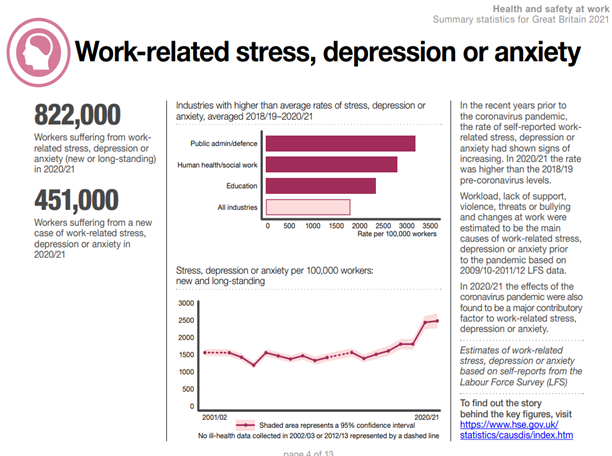MENTAL HEALTH IS THE NUMBER ONE REASON FOR WORK RELATED ILLNESS IN THE UK AND NUMBERS ARE ON THE RISE.
Statistics published by the Health and Safety Executive (HSE), covering the 2020/21 period, show of the 1.7 million workers suffering from a work-related illness, 800,000 were stress, depression or anxiety.

Even before the pandemic took hold, it was estimated that mental health issues cost UK employers up to £45 billion a year.
Whether you’re a small business or a large corporation, the law requires all employers to prevent work related stress to promote, support and sustain good mental health in the workplace.
All managers should be given the skills to support employees with mental health issues, NICE and PHE have said in new guidance.

Reducing stigma and equipping managers with skills to have conversations with employees about mental health is likely to facilitate conversations that address concerns about their mental wellbeing, the guideline says.
National Institue for Health and Care Excellance (NICE) and Public Health England’s guideline on Mental Wellbeing at Work covers how to create the right conditions to support mental wellbeing at work through an environment and culture of participation, equality, safety and fairness in the workplace based on open communication.
The independent guideline committee, made up of mental health experts, employers, professionals from across the NHS, local authority members, and lay members, recommended when offering mental health training for managers, employers should consider including:
- how to have a conversation about mental wellbeing with an employee
- information about mental wellbeing
- how to identify early warning signs of poor mental wellbeing
- resources on mental wellbeing
- awareness of the stigma associated with poor mental wellbeing
- ongoing monitoring of mental wellbeing in the workplace
The guideline says the training should equip managers with the knowledge, tools, skills and resources to improve awareness of mental wellbeing at work. It should also improve employees’ understanding of and engagement in organisational decisions and the communication between managers and employees.
Dr Paul Chrisp, director of NICE’s centre for guidelines, said: “Even before the pandemic, the state of the nation’s mental health has been a topic of conversation at home, in the workplace and in the media.
“Our new guideline has considered issues which were a problem before COVID-19 emerged and new issues which have presented themselves as a result of the pandemic.
“Reducing stigma and equipping managers with skills to have conversations with employees about mental health is likely to facilitate conversations between managers and employees about any concerns about their mental wellbeing. This makes it more likely that managers can support employees with mental health issues.
“Further research is needed in this area, but providing managers with skills to discuss mental wellbeing improves the relationship between manager and employee so that they can identify and reduce work stressors.
“This is a practicable step employers can implement and adopted quickly without a huge amount of investment.”
The committee agreed that it was important that all line managers received training and support. They considered that this was good practice in all industries and all sizes of organisation, and that managers benefit in terms of their mental wellbeing from feeling skilled to perform their line management duties.

EC Safety Solutions are able to deliver various First Aid for Mental Health Courses from our office in Strood, Kent.
- Level 1 Award in Awareness of First Aid for Mental Health in the workplace - 1/2 day.
- Level 2 Award in First Aid for Mental Health in the workplace - 1 day.
- Level 3 Award in Supervising First Aid for Mental Health in the workplace - 2 days.
As well as the above Face to Face courses we also offer a range of eLearning mental Health Courses, Such as Mental Health Awareness, Mental Health First Aid and Developing a Workplace Mental Health Policy
Contact Steve Waterman on 0800 1930246 or email [email protected] for more info on the courses and dates available.
News Archive
HSE News

.jpg)